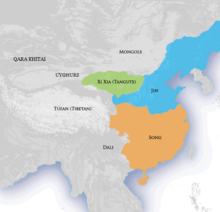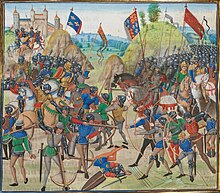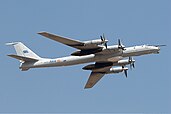Portal:History
The History Portal

History by Frederick Dielman
History (derived from Ancient Greek ἱστορία (historía) 'inquiry; knowledge acquired by investigation') is the systematic study and documentation of the human past. History is an academic discipline which uses a narrative to describe, examine, question, and analyse past events, and investigate their patterns of cause and effect. Historians debate which narrative best explains an event, as well as the significance of different causes and effects. Historians debate the nature of history as an end in itself, and its usefulness in giving perspective on the problems of the present.
The period of events before the invention of writing systems is considered prehistory. "History" is an umbrella term comprising past events as well as the memory, discovery, collection, organization, presentation, and interpretation of these events. Historians seek knowledge of the past using historical sources such as written documents, oral accounts or traditional oral histories, art and material artefacts, and ecological markers.
Stories common to a particular culture, but not supported by external sources (such as the tales surrounding King Arthur), are usually classified as cultural heritage or legends. History differs from myth in that it is supported by verifiable evidence. However, ancient cultural influences have helped create variant interpretations of the nature of history, which have evolved over the centuries and continue to change today. The modern study of history is wide-ranging, and includes the study of specific regions and certain topical or thematic elements of historical investigation. History is taught as a part of primary and secondary education, and the academic study of history is a major discipline in universities.
Herodotus, a 5th-century BCE Greek historian, is often considered the "father of history", as one of the first historians in the Western tradition, though he has been criticized as the "father of lies". Along with his contemporary Thucydides, he helped form the foundations for the modern study of past events and societies. Their works continue to be read today, and the gap between the culture-focused Herodotus and the military-focused Thucydides remains a point of contention or approach in modern historical writing. In East Asia a state chronicle, the Spring and Autumn Annals, was reputed to date from as early as 722 BCE, though only 2nd-century BCE texts have survived. The title "father of history" has also been attributed, in their respective societies, to Sima Qian, Ibn Khaldun, and Kenneth Dike. (Full article...)
Featured picture
Did you know (auto generated)

- ... that in 1993, the U.S. Supreme Court upheld West Virginia's largest punitive damages award in history, awarding $10 million – 526 times larger than the compensatory damages?
- ... that Art Rooney Jr. presided over what one Pro Football Hall of Fame selector described as "the best drafting run in NFL history"?
- ... that American Colossus, a history book that describes how a banker bailed out the U.S. government in 1895, was published around a time when the U.S. government bailed out banks?
- ... that Puerto Rico's Willie Hernández became the highest paid player in Detroit Tigers history after winning Cy Young and Most Valuable Player awards and a World Series?
- ... that no one laughed at the worst joke in legal history?
- ... that Eli N. Evans authored three books about the culture and history of Jews in the American South?
Wail Mohammed al-Shehri (Arabic: وائل الشهري, romanized: Wāīl ash-Shehrī; or Alshehri; July 31, 1973 – September 11, 2001) was a Saudi school teacher and terrorist hijacker. He was one of five hijackers of American Airlines Flight 11, which was flown into the North Tower of the World Trade Center as part of the September 11 attacks.
Wail al-Shehri was an elementary school teacher from Khamis Mushait in the Asir region of Saudi Arabia. In early 2000, he traveled to Medina to seek treatment for mental problems. He and his younger brother Waleed traveled to Afghanistan in March 2000 and joined an Al-Qaeda training camp. The brothers were chosen, along with others from the same region of Saudi Arabia, to participate in the September 11 attacks. Once selected, al-Shehri returned to Saudi Arabia in October 2000 to obtain a clean passport, then returned to Afghanistan. In March 2001, he recorded his last will and testament on video. (Full article...)
On this day
January 23: Little New Year in southern China (2025)
- 1368 – The Hongwu Emperor (pictured) ascended to the throne, initiating the Ming dynasty, which would rule China for three centuries.
- 1571 – Queen Elizabeth I opened the Royal Exchange in London, giving it its royal title.
- 1846 – Ahmad Bey declared the legal abolition of slavery in Tunisia.
- 1870 – American Indian Wars: The United States Army killed about 200 Piegan Blackfeet, mostly women, children, and the elderly, in the Marias Massacre.
- 1915 – Rebels led by John Chilembwe attacked local plantation owners, beginning an uprising regarded as a key moment in the history of Malawi.
- 2003 – The final signal was detected from the NASA space probe Pioneer 10, then about 12 billion kilometres (7.5 billion miles) from Earth.
- Antonio Díaz Soto y Gama (b. 1880)
- Guida Maria (b. 1950)
- Hsu Tain-tsair (b. 1953)
Selected quote
What we find in books is like the fire in our hearths. We fetch it from our neighbors, we kindle it at home, we communicate it to others, and it becomes the property of all.
— Voltaire, 18th century French philosopher
Related portals
More Did you know...
- ... that the Soviet Tupolev Tu-142 (pictured) maritime patrol aircraft was developed in response to the American UGM-27 Polaris submarine-launched ballistic missile?
- ... that Harry Powers said that watching his victims die was more fun than a brothel?
- ... that the effort put forth by the subject of Miró's 1937 Naked woman climbing a staircase and her heavy limbs are thought to reflect the tragedy of the Spanish Civil War?
- ... that 49% of German military losses happened in the last 10 months of the Second World War in Europe?
- ... that Thomas Edison lost a fortune in his ore-milling company, but "had a hell of a good time spending it"?
- ... that American McCaull Comic Opera Company actress May Yohé, once the owner of the Hope Diamond, died poor?
- ... that Egyptian political cartoonist Ahmad Nady took part in the 2011 Egyptian revolution, drawing cartoons while he demonstrated?
- ... that finds unearthed at the Israelite Tower in Jerusalem's Jewish Quarter attest to the Babylonian sack of the city in 586 BCE?
Topics
Categories

History • By period • By region • By topic • By ethnic group • Historiography • Archaeology • Books • Maps • Images • Magazines • Organizations • Fictional • Museums • Pseudohistory • Stubs • Timelines • Chronology • People • Wikipedia historians
WikiProjects
![]() WikiProject History •
Ancient Near East • Australian History • Classical Greece and Rome • Dacia • Former countries • History of Canada • Chinese history • European history • Heraldry and vexillology • Indian history • Jewish history • Medieval Scotland • Mesoamerica • Military history • Middle Ages • History of Science
WikiProject History •
Ancient Near East • Australian History • Classical Greece and Rome • Dacia • Former countries • History of Canada • Chinese history • European history • Heraldry and vexillology • Indian history • Jewish history • Medieval Scotland • Mesoamerica • Military history • Middle Ages • History of Science
WikiProject Time • Days of the Year • Years
WikiProject Biography • Composers • Political figures • Saints • United States Presidents
Things you can do
 |
Here are some tasks awaiting attention:
|
Associated Wikimedia
The following Wikimedia Foundation sister projects provide more on this subject:
-
Commons
Free media repository -
Wikibooks
Free textbooks and manuals -
Wikidata
Free knowledge base -
Wikinews
Free-content news -
Wikiquote
Collection of quotations -
Wikisource
Free-content library -
Wikiversity
Free learning tools -
Wiktionary
Dictionary and thesaurus
























































